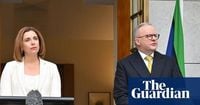In a significant policy reversal, the Australian government announced on July 30, 2025, that YouTube will now be included among the social media platforms banned for users under 16 years old, starting December 10, 2025. This decision overturns the earlier stance from November 2024, when YouTube was exempted from the world-first legislation that restricts Australian children under 16 from accessing platforms such as Facebook, Instagram, Snapchat, TikTok, and X.
The announcement, made by Communications Minister Anika Wells, comes after mounting evidence of harm experienced by children on YouTube. Wells cited government research indicating that four out of ten Australian children reported their most recent online harm occurred on YouTube. "The evidence cannot be ignored," she said, emphasizing the government's commitment to protecting young users despite threats of legal action from Alphabet Inc., YouTube's U.S.-based parent company.
Under the new rules, children under 16 will still be able to access YouTube’s content, but they will be prohibited from creating their own accounts. Platforms failing to take "reasonable steps" to exclude underage users face fines of up to 50 million Australian dollars (approximately 33 million U.S. dollars). While the government has not explicitly defined what constitutes these "responsible steps," Wells assured that platforms must deactivate existing accounts held by children, prevent new account creation by minors, and stop attempts to circumvent these restrictions.
YouTube pushed back against the ban, reiterating its position as a video-sharing platform rather than a social media service. In a statement, the company said, "Our position remains clear: YouTube is a video sharing platform with a library of free, high-quality content, increasingly viewed on TV screens. It’s not social media." YouTube also criticized the government for reversing its prior commitment to exclude the platform from the ban and indicated it would consider next steps, including potential legal challenges.
Prime Minister Anthony Albanese expressed the government’s determination to combat online harms affecting young Australians. "Our government is making it clear—we stand on the side of families," he said during the announcement. Albanese highlighted social media’s "social responsibility" and acknowledged the negative impact these platforms have on children. He pledged to advocate for similar measures internationally, planning to campaign at the United Nations General Assembly in New York in September 2025 to garner global support for banning children from social media.
The government’s decision follows a June 2025 recommendation by the internet regulator, led by eSafety Commissioner Julie Inman Grant, to include YouTube in the ban. The regulator noted that 37% of children who had encountered harmful content online reported seeing it on YouTube, a figure that underscores the platform’s significant reach among young users. Data released by eSafety in July 2025 further confirmed YouTube as the most popular social media platform among Australian children aged 10 to 15, with 76% reporting use, surpassing TikTok (56%), Instagram (47%), and Snapchat (46%). Notably, YouTube Kids, a curated app for children under 12, was not included in the ban due to its limited interactive features and lower viewership compared to regular YouTube.
Minister Wells addressed concerns about age verification, clarifying that users would not need to upload personal identification documents such as passports or driver’s licenses to prove their age. Instead, platforms are required to provide alternative methods to verify age, leveraging existing data. "These platforms know with deadly accuracy who we are, what we do and when we do it," Wells explained, noting that platforms have extensive information about users’ histories and behaviors, which can be used to enforce age restrictions effectively.
The government also clarified that certain services, including online gaming, messaging apps, education, and health-related platforms, are exempt from the ban. These services are considered less harmful or are regulated under different laws. The minimum age restriction aims to mitigate a range of harmful impacts on children, including addictive behaviors driven by manipulative platform designs, social isolation, disrupted sleep patterns, poor mental and physical health, low life satisfaction, and exposure to inappropriate or harmful content.
Despite the government's firm stance, some political opposition and industry voices have raised concerns. Shadow Communications Minister Melissa McIntosh accused the Albanese government of a "blatant broken promise" for reversing the exemption on YouTube after the legislation passed Parliament on the premise that YouTube would be excluded. Greens spokesperson Sarah Hanson-Young criticized the blanket ban as "delusional," arguing that it is a blunt instrument unlikely to make children safer, as they will find ways to circumvent restrictions. She called for stronger regulations and a duty of care from platforms.
Tech companies have privately expressed apprehension about the lack of detailed guidance on what constitutes "reasonable steps" for age verification, with expectations that the government will provide more clarity in the coming months. Nonetheless, Minister Wells emphasized that platforms have been on notice since December 2024 and have had ample time to collaborate with the eSafety Commissioner to develop compliant solutions. "The onus here is on the platforms," she said. "Come 10 December, if your kid has a Facebook login, Facebook account, it is on Facebook to deactivate that account. It’s not on the parent to police that on behalf of Facebook." She described the new rules as "world-leading" and essential for protecting children online.
Prime Minister Albanese acknowledged the complexity of implementing the ban, recognizing that it will not be simple or easy. However, he expressed confidence that tech companies possess the necessary data and capacity to enforce age restrictions. "Social media does have more information about what [a person] does than perhaps some people who are your close friends," he remarked, referring to the extensive tracking capabilities of these platforms.
The Australian government’s move represents a pioneering approach to digital child protection, seeking to balance access to information and entertainment with safeguarding young users from the growing risks associated with social media. While the debate over definitions, enforcement, and efficacy continues, the December 10 implementation date marks a critical milestone in the global conversation about children’s online safety.


